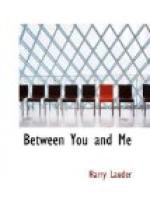I’ve known worse days, tak’ them all in all, than those in Eddlewood Colliery. We’d a bit cabin at the top of the brae, and there we’d keep our oil for our lamps, and leave our good coats. We’d carry wi’ us, too, our piece—bread and cheese, and cold tea, that served for the meal we ate at midday.
‘Twas in the pit, I’m thinkin’, I made my real start. For ’twas there I first began to tak’ heed of men and see how various they were. Ever since then, in the days when I began to sing, and when my friends in the audiences decided that I should spend my life so instead of working mair with my twa hands, it’s been what I knew of men and women that’s been of service to me. When I come upon the idea for a new song ’tis less often a bit of verse or a comic idea I think of first—mair like it’s some odd bit of humanity, some man a wee bit different from others. He’ll be a bit saft, perhaps, or mean, or generous—I’m not carin’, so long as he’s but different.
And there, in the pit, men showed themselves to one another, and my een and my ears were aye open in those days. I’d try to be imitating this queer character or that, sometimes, but I’d do it only for my ain pleasure. I was no thinkin’, in yon days, of ever singing on the stage. How should I ha’ done so? I was but Harry Lauder, strugglin’ hard to mak siller enough to help at home.
But, whiles I was at my work, I’d sing a bit song now and again, when I thought no one was by to hear. Sometimes I was wrong, and there’s be one nearer than I thought. And so it got aboot in the pit that I could sing a bit. I had a good voice enough, though I knew nothing, then, of how to sing—I’ve learned much of music since I went on the stage. Then, though, I was just a boy, singing because he liked to hear himself sing. I knew few and I’d never seen a bit o’ printed music. As for reading notes on paper I scarcely knew such could be done.
The miners liked to have me sing. It was in the cabin in the brae, where we’d gather to fill our lamps and eat our bread and cheese, that they asked me, as a rule. We were great ones for being entertained. And we never lacked entertainers. If a man could do card tricks, or dance a bit, he was sure to be popular. One man was a fairish piper, and sometimes the skirl of some old Hieland melody would sound weird enough, as I made my way to the cabin through a grey mist.
I was called upon oftener than anyone else, I think.
“Gie’s a bit sang, Harry,” they’d say. Maybe ye’ll not be believing me, but I was timid at the first of it, and slow to do as they asked. But later I got over that, and those first audiences of mine did much for me. They taught me not to be afraid, so long as I was doing my best, and they taught me, too, to study my hearers and learn to decide what folk liked, and why they liked it.
I had no songs of my own then, ye’ll understand; I just sang such bits as I’d picked up of the popular songs of the day, that the famous “comics” of the music halls were singing—or that they’d been singing a year before—aye, that’ll be nearer the truth of it!




